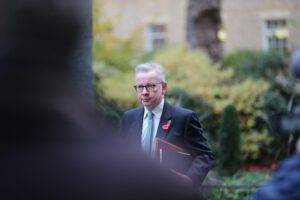Bonuses return at Lloyds Banking Group as profits surge fivefold to £6.9bn

Bonuses are back for Lloyds bankers, after annual profits jumped more than fivefold last year.
The banking group said it was reintroducing bonuses for staff with a pool worth £399m, having scrapped payouts due to the impact of the pandemic a year earlier.
The decision reflected the stronger economic outlook and the bank’s higher profits, Lloyds said. It also confirmed that higher bonuses would be handed to staff who deal with customers.
Meanwhile, the bank revealed that it had 21 bankers on its payroll earning more than €1m (£835,000) a year, up from 17 staff a year earlier. One unnamed banker earned between €4.5m and €5m last year. That is more than the £2.5m paid to ex-chief executive António Horta-Osório, who stepped down last April. Its new boss, Charlie Nunn – who took over in August – was paid £1.3m, including a £349,000 bonus.
Lloyds said it had frozen – and was considering cancelling – unpaid bonuses for a trio of former bosses over charges linked to the HBOS Reading scandal, given they were in leadership positions during a failed compensation scheme that was later deemed “neither fair nor reasonable”. It has resulted in a re-reviewing of compensation for victims in a scheme known as the Foskett Panel.
The suspension is understood to affect more than £1m worth of bonuses that were set to be paid to Horta-Osório this year. The decision also affects Lloyds’ former chief financial officer George Culmer and ex-chief operating officer Juan Colombás.
In total, the bank took a £790m charge related to the HBOS Reading controversy which saw business customers pushed into distress or failure after they were loaded with unmanageable debts and fees between 2003 and 2007. It brought its total remediation charge – linked to dealing with past misconduct – to £1.3bn for 2021.
Lloyds said “significant uncertainties remain” around the total financial impact of the HBOS Reading scandal and that it continued to support the dual set of reviews, including into how Lloyds handled the controversy. “We continue to support the independent Foskett Panel re-review and Dame Linda Dobbs’ independent review process as we work to bring this matter to a conclusion,” Lloyds said.
But the group, which owns Halifax and is the UK’s largest mortgage lender, still reported annual profits of £6.9bn, significantly higher than the £1.2bn reported for 2020. While the increase was partially due to higher income, the biggest impact came from the reversal of loan loss charges throughout the year.
Lloyds released a total of £1.2bn worth of loan loss charges throughout 2021. That is compared with the £4.2bn it had been forced to put aside in order to offset a potential jump in loan defaults during the pandemic.
However, despite the surge in profits, Lloyds failed to meet average analyst forecasts for £7.2bn in profits.
Lloyds shares were down 9% on Thursday at 47p each. That was despitehigher shareholder payouts, with Lloyds announcing a dividend of 1.33 pence a share, bringing the total ordinary dividend for the year to 2p per share. It also announced a share buyback programme worth £2bn.
With news overnight that Russia had invaded Ukraine, Nunn confirmed that UK banks had “been working closely with the government in the last few weeks”, including to make sure they had the right policies in place to enforce sanctions against Moscow.
Major lenders including Lloyds, Barclays and NatWest met Treasury minister John Glen on Wednesday afternoon to discuss the impact of sanctions, as well as the risk of cyber-attacks from Russia.
Nunn said that although the outlook “remains uncertain”, particularly in light of new Covid variants and the impact of inflation on customers’ finances, he was “confident that the group is well-placed to deliver increased returns”.
The news came as he laid out a new strategy for the bank, which will mean focusing on areas including wealth management, while growing its market share in business banking, expanding its range of consumer products such as motor finance, and increasing income from larger corporate clients.




